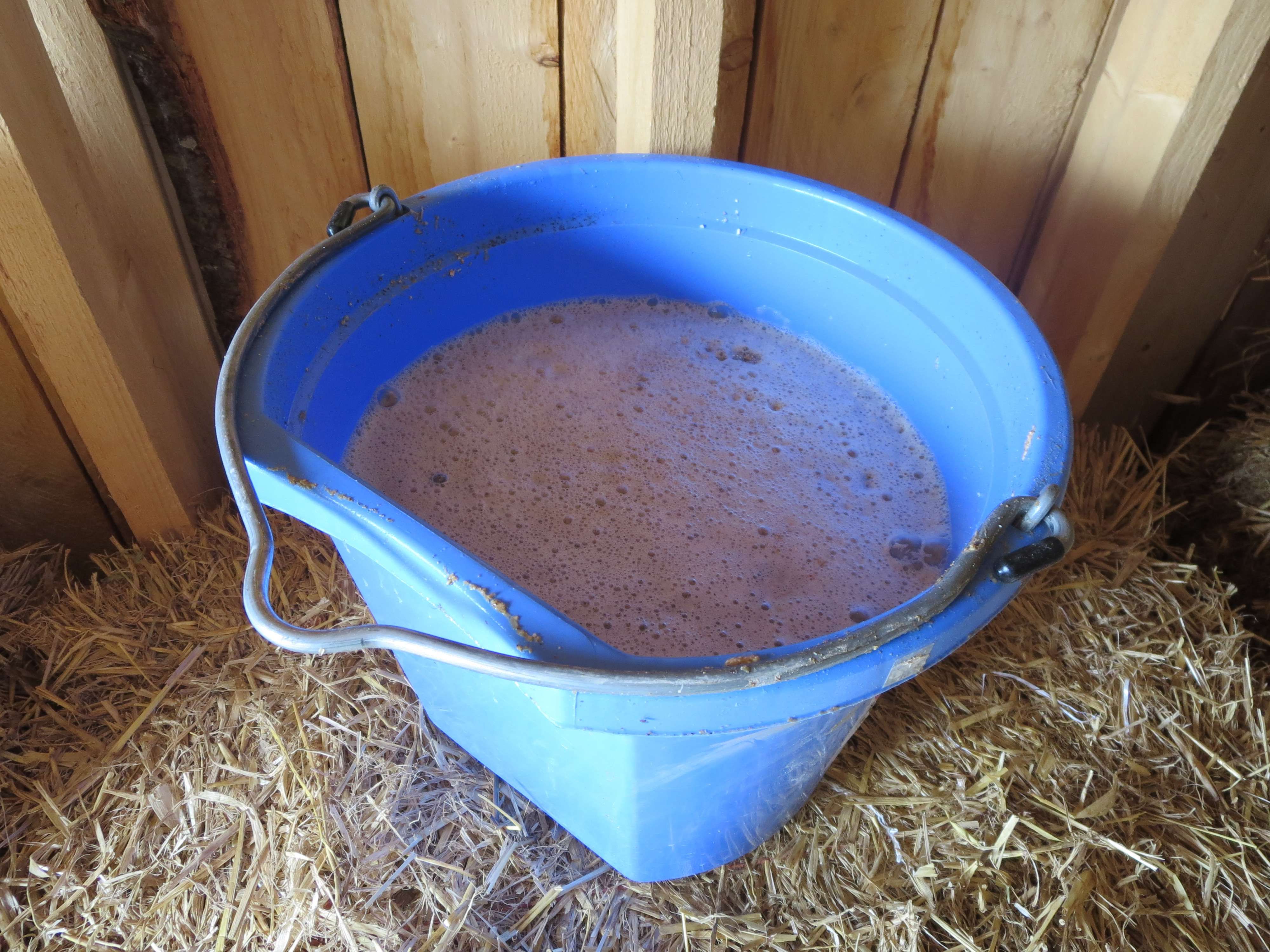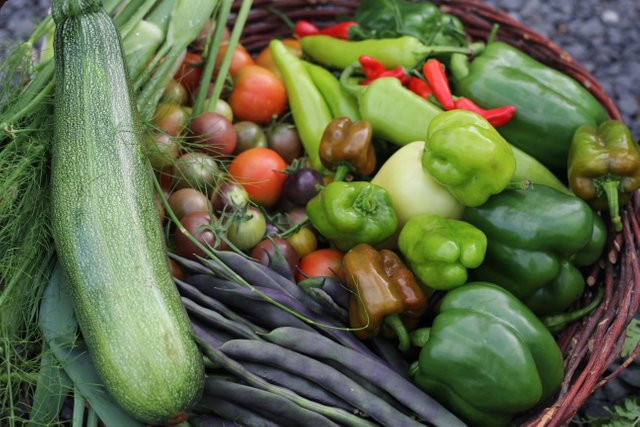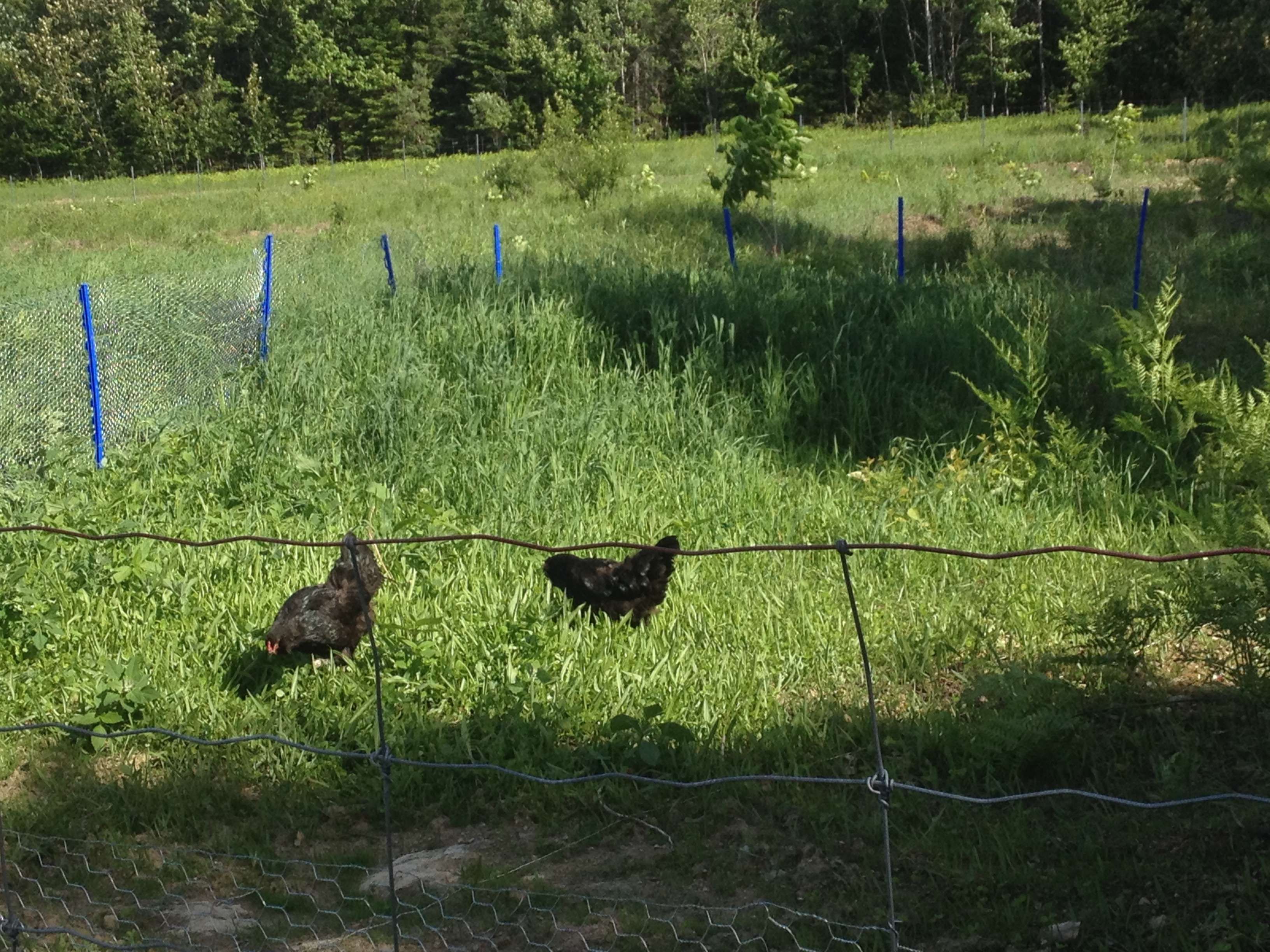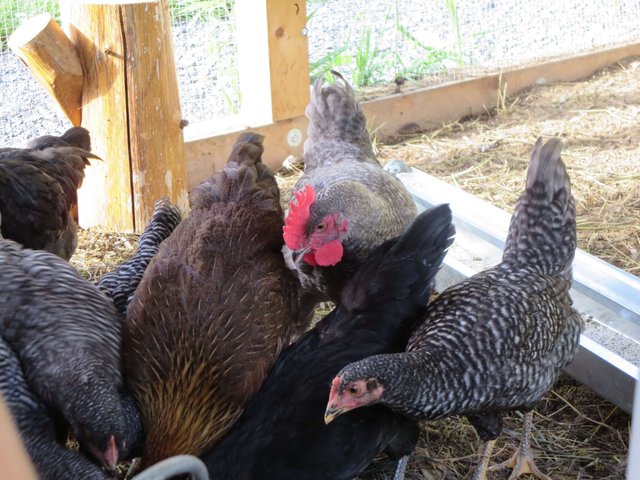16+ Ways To feed chickens
.jpg)
Spring will soon be here and you know what that means right? Sweet little baby chicks. If you've been thinking about adding a flock of hens to your back garden or homestead, this guide will give you plenty of ideas on all the different ways you can feed them.
Chickens are omnivores and they benefit from a space to forage for wild edibles, earth worms and insects. You might find that over the summer your feed requirements can be reduced as much as 30% by providing your hens with access to a pasture. A varied diet will contribute to healthier chickens and more nutritious eggs content.
Fermented Feed
Although there are few studies offered for fermented feed with poultry, we are aware of the health benefits in fermented foods for humans. The chickens prefer it to dried feed and they are healthy. That's evidence enough for us. Some people report that egg shells are stronger and the yolks brighter, I haven't done a comparison but I do know our eggs are fantastic!
How To Ferment Feed
Take one part feed to two parts water and add a tbsp of apple cider vinegar. Stir well and store covered with cheesecloth or a piece of lightweight cotton fabric for three to four days. Stir the feed daily adding water if the feed has absorbed too much liquid.
When it's ready it will have a tangy slightly sour smell to it. Serve it in hard plastic or rubber bowls or trays.
Keep feeding the fermenting bucket with more feed and water and stir daily to continue the fermentation cycle.

Bagged Chicken Feed
The nutritional needs of your birds will change as they grow. Bagged feed is available for each of the stages that your layers and meat birds go through.You can buy regular or organic formulas.
Commercial feed is convenient and it is formulated to offer complete nutrition to your chickens. That said, if you had to eat the same thing day after day you would quickly tire of it and this happens with animals as well. A varied diet is not only essential for good health, it's also beneficial to your pocket book. There are a lot of different foods that chickens can eat and many of them are extremely economical or free.
Feed is formulated for chickens at their different stages of growth. Layer ration often contains calcium and egg shells for egg formation where Finisher ration does not.
TYPICAL FORMULATIONS:
Starter
0-5 weeks for all chicks
Grower
5-13 weeks for meat birds 5-16 weeks for layers, Layer: 16+ weeks for layer
Finisher: 13+weeks for meat birds
Starter comes in medicated and un-medicated with the exception of organic feed. Generally that comes in non medicated
Food Scraps
We don’t feed our chickens meat products, mostly because our dogs get the scraps. The chickens get plenty of worms, bugs and grubs over the three seasons that they are able to be outdoors. It is safe to feed offal and meat scraps to your birds as long as they are fresh. I do not recommend feeding chicken to chickens. It may encourage cannibalism,which you absolutely don't want to deal with!
When feeding kitchen scraps to your flock you might want to check your regulations because in some countries (such as Britain), it is illegal to feed chickens your household scraps. This highly unreasonable regulation is not common in most countries.
Mash
We save stale but not mouldy bread, pasta, oatmeal, vegetable scraps and dairy and make them a mash with it. To make a mash you simply add the ingredients to a pot, add some water if necessary and cook it until you have a soft mash.
Grains
If you have room you can grow things like corn, legumes, wheat, barley, rye or oats as feed for your flock. You can also look for bags of grains to purchase.
Formulating your own recipes from bulk grains can be cheaper than purchasing commercial bagged feed. Just make sure you understand how to get the correct nutritional balance. As long as your chickens are getting a varied diet this can be a great solution. It is an ideal way to control what goes into your chicken feed.
Vegetables
If you have a garden you can feed your chickens plenty of fresh vegetables throughout the summer. They love squash, cucumbers, greens and rarely turn down anything fresh. For items with a hard outer shell such as squash or pumpkin you will want to split them open.

Cover Crops
f you practice garden or pasture rotation you can plant healthy cover crops that will feed nutrients into your soil and also provide food for your chickens.
With careful management you can let the chickens directly range on the pasture or in that garden space.
you can also plant cover crops in raised beds!
Pasture/Forage
you have the land, allowing your chickens to graze in a wild pasture can be extremely beneficial to them and it will reduce your feed costs. They will eat a variety of grasses, wild flowers, clovers and tend to leave what they don’t like alone. They never touch the Black Eyed Susan’s in our pasture but eat most other things. You can even create silage for winter months. This is a classic process of cutting, storing and fermenting hay, grasses, weeds and other things that grow on your property and converting it to feed for the winter.

Vermicomposting
Vermicomposting is the process of using worms to create manure for your garden. The worm population will grow quite quickly over the summer and you can feed your excess worms to your chickens.
Grit
Grit is simply tiny pebbles and sand. Your chickens will find their own grit when they are pecking around the ground, but you should offer a dish of it should there be periods where they don’t have access to the outdoors. You should always have a dish of grit for baby chicks to help them digest food and especially any little treats you provide to them.
Calcium & Phosphorous
lack of calcium in your hens diets will lead to thin eggshells. We have a tray of ground oyster shells mounted to the wall in the run. The hens can take what they want when they need it. We also wash, dry and crush egg shells for the same purpose.
Depending on your feed formula and your chickens access to hard shelled bugs such as beetles, you might also need to supplement with phosphorus.
It is required to break down calcium. Hard shelled bugs can provide some of this to your free range chickens but it is best that if you are supplementing calcium that you also give them free choice access to phosphorus. You can buy defluorinated rock phosphate or phosphorus-16 to serve this purpose
Kelp (Seaweed) Meal
Kelp meal is made from brown seaweed that grows along the North Atlantic shorelines of Canada. It contains over 60 minerals and elements plus essential vitamins, carbohydrates and amino acids. It is used as a nutritional supplement for poultry and other livestock.
Mineral Conditioner
Mineral conditioners will provide calcium, salt, phosphorous and a lot of other minerals to your hens. Don’t mix it on with their feed. If you choose to use this, provide it in a separate dish. Chickens seem to know what they need and when.
Sprouted Seeds
In the winter the chickens are kept to their coop and sheltered run. The ground is buried under deep snow so there is nothing for them to forage and certainly no garden scraps either. We have taken to sprouting seeds indoors to feed to them.
You don’t really need anything special to sprout lentils and other seeds. Sprouting trays do make the job a little more convenient though and they are quite inexpensive. You can make your own sprouting jar using a glass jar, rubber band and any sort of pliable mesh screen (such as bug screen).
Fodder
Similar to sprouting greens, fodder is a more intensive method where you sprout large trays of barley or other nutritious crop seeds. Its a great way to feed your poultry in the winter and its very economical.
There are a lot of systems available on the internet for you to explore. A lot of the ready made systems available are very expensive and designed for larger operations but there are many DIY tutorials available and the method is quite similar to the one for sprouting seeds
Apple Cider Vinegar
There is no hard evidence that apple cider vinegar is an effective tool for keeping poultry healthy. Fortunately interest in the subject has grown enough that there are some research papers available. These papers suggest that it is beneficial. Apple cider is said to cause an alkaline effect in the chickens body which reduces the likelihood of illness and helps support the immune system.
Apple cider vinegar is full of vitamins, minerals and trace elements that many people believe are beneficial to humans and animals alike. ACV aids in lowering the pH level in the stomach, helping with digestion and making it a less friendly environment for harmful pathogens. A cap full in your poultry waterer (plastic – not metal) is all you need. Have a shot of it yourself, while you are at it!
Water
Chickens must always have access to fresh, clean water. In the summer algae and scum can form in water containers, so be sure to clean them out well and change the water often.
Things Chickens should NOT eat!
Chickens will pass by certain things in the pasture. They can often sense when something is dangerous to eat. To be on the safe side, avoid giving them food that is known to be detrimental to their health. This includes rhubarb leaves, coffee grinds, fast food, raw meat, rotten food, pits and seeds, chocolate, citrus fruit, raw beans, green potatoes & unripe green tomatoes.
As you can see, there are a lot of ways to feed your chickens that will keep them happy and healthy while cutting back on your overall expenses ...heck, that means you can get even more chickens right?

You might also enjoy reading 8+ Ways To Preserve & Store Eggs
Disclaimer This is a modified chapter from my self published ebook "The Homesteader's Handbook: Raising Chickens". If you are enjoy reading chapters from my book, let me know and I'll continue to share them exclusively on steemit.
Building a greener, more beautiful world one seed at a time.
Homesteading | Gardening | Frugal Living | Preserving Food| From Scratch Cooking|
You can also find me at: walkerland.ca
Photo copyright: @walkerland

We raised chickens years ago and always used:
NEVER knew you could ferment their food! How cool!
Fermented feed is great. We actually did this when we raised our pigs, they loved it and were super healthy, glossy hair and all that.
Nice, informative post!
We use a combination of fermented feed and grain, table scraps, and free range foraging to feed ours. They are healthy as can be and lay the best eggs! :D
We do pretty much the same as you, with garden vegetables thrown in as well. They really are healthy and beautiful so I know it works.
That's true, I forgot to mention they get garden scraps and reject veggies too. It is great! Been doing it for years and wont go back to dry feed. :D
Such a huge difference between the health and productivity of my birds and some of my neighbors who keep them locked in a coop with a small run and endless dry pellets to eat. No comparison.
...and this is why I say chickens are the best and easiest farm animals of all!!
It's true, I mean .. no other animal delivers us fresh breakfast each morning right? They have their moments however (lol). Sometimes I want to send them all packing to a new homestead when the drama kicks up. :)